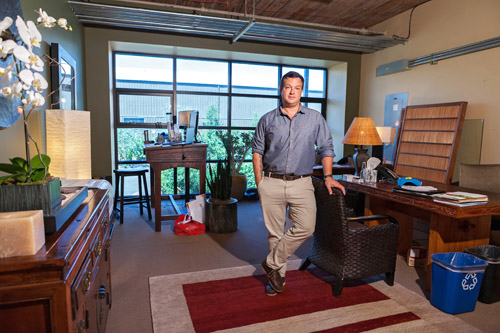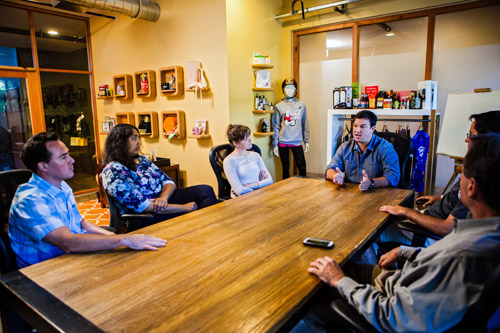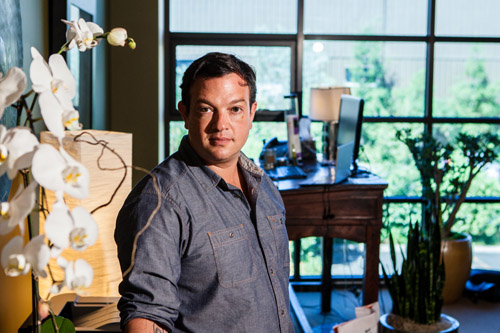BY LINDA BAKER
David Howitt explains why Portland consumer brands like Stumptown and Voodoo Doughnuts are taking the world by storm.
 BY LINDA BAKER | PHOTOS BY JASON KAPLAN
BY LINDA BAKER | PHOTOS BY JASON KAPLAN
The Meriwether Group
CEO: David Howitt
Headquarters: Portland
Employees: 11
Factoid: Once a year, Meriwether staff does a team cleanse, including 30 days of green juice and raw food
David Howitt is in his Northwest Portland office, explaining why Portland consumer brands like Stumptown and Voodoo Doughnuts are taking the world by storm. “These businesses are being birthed from founders who are first and foremost in their craft. It’s literally woven into the DNA of their company. You can’t come up with coolness, authenticity and irreverence. Starbucks can’t decide they are going to launch an irreverence initiative. The consumer will sniff it out and know it’s bullshit.
“We have the dirt under the fingernails and that’s why Portland is disrupting the status quo in ways that are more profound than anywhere else.”
When Howitt, 46, talks about Portland’s “secret sauce,” people listen. The CEO of Meriwether Group, a business acceleration firm, Howitt is the man behind the curtain, a deal broker who has helped many of the city’s flagship independent businesses grow and expand to other cities.
In 2011 Howitt helped Stumptown Coffee Roasters sell a majority stake to the San Francisco private equity firm TSG. That deal became part of Portland hipster brand lore — and paved the way for the sales of Dave’s Killer Bread and Laughing Planet Cafe, also orchestrated by Howitt.
Oregon entrepreneurs who sell parts of their companies to outsiders are often labeled sellouts. Howitt wants to change the narrative.
 “We need to embrace the notion that companies can take out capital, export to other cities and maintain authenticity. “Yes, Starbucks and other consumer brands started out small and grew “tired, stale.” But it doesn’t have to be that way. “There is something called Dunkin’ Donuts.” Howitt expounds. “Portland’s Dunkin’ Donuts is Voodoo. There is something called Red Robin; Portland’s version is Little Big Burger.”
“We need to embrace the notion that companies can take out capital, export to other cities and maintain authenticity. “Yes, Starbucks and other consumer brands started out small and grew “tired, stale.” But it doesn’t have to be that way. “There is something called Dunkin’ Donuts.” Howitt expounds. “Portland’s Dunkin’ Donuts is Voodoo. There is something called Red Robin; Portland’s version is Little Big Burger.”
“We are birthing that next generation, but it is different this time. It is homespun and heartfelt.”
A former corporate counsel and director of licensing for Adidas, Howitt is an investor, dealmaker and storyteller — encased in a new-age sheen. His marketing spiel includes references to the Heisenberg uncertainty principle, Buddha and the Wizard of Oz, and he is fond of describing the world as a set of dualities in need of resolution. The company’s mantra is the “power of ‘and’ versus the tyranny of ‘or.’” As in: “This region has heritage and authenticity, and it also has push-your-envelope, newness, disruption. We can be both.”
A collaboration between Voodoo and Pendleton Woolen Mills illustrates the point. The 104-year-old heritage brand and edgy doughnut shop are partnering on a limited-edition blanket featuring Voodoo designs and logos. It sounds gimmicky, but the blanket, to be released this holiday season, is part of a larger Meriwether-facilitated effort to make Pendleton more relevant to younger customers, Howitt says.
The fact that Voodoo and Pendleton jumped on the idea “shows uniquely what we can do in Oregon.” He pauses. “This is cool stuff.”
 In a world where authenticity and coolness sells, how do you prevent coolness from being commodified? This is the conundrum facing consumer brands today. Howitt’s solution is to work only with “disruptors,” companies that have a core meaning and purpose beyond the bottom line — and then ensure that purpose endures as the business grows. For example, the contractual terms of the Dave’s Killer Bread sale included continuing the founder’s practice of hiring ex-convicts.
In a world where authenticity and coolness sells, how do you prevent coolness from being commodified? This is the conundrum facing consumer brands today. Howitt’s solution is to work only with “disruptors,” companies that have a core meaning and purpose beyond the bottom line — and then ensure that purpose endures as the business grows. For example, the contractual terms of the Dave’s Killer Bread sale included continuing the founder’s practice of hiring ex-convicts.
Meriwether itself rebranded three years ago around the purpose-driven tagline “Fulfill your journey.” It’s a riff on the Hero’s Journey, a universal pattern of narrative identified by scholar Joseph Campbell in which an archetypal hero ventures into the unknown, overcomes various challenges and returns to bestow his largesse on the community.
Entrepreneurs are modern-day heroes, Howitt says. “The founders of businesses we’ve worked with have stayed here; pay taxes, hire people, buy more from local supply chains. These people better the world, and if we can be part of it, we’re doing our share.”
Headquartered in the Northwest industrial District — it “combines east-side energy and west-side convenience” — Meriwether Group has an 11-person team and several divisions, including an investment fund that invests in young companies. The firm has been growing 40% annually, with about 70% of business dedicated to business acceleration; i.e., guiding Voodoo’s upcoming expansion into Japan, a move that will involve “sake icings on the doughnuts or icons considered pushing the envelope there,” Howitt says.
Meriwether has been fielding calls from companies outside Oregon and recently landed the iconic New York City brand ABC Carpet & Home as a client. “They want to tap into the specialness here,” Howitt says.
There’s a certain irony to Howitt’s professional evolution. Howitt has found “creative ways for companies to grow without compromising their values,” says Mike Thelin, co-founder of the international food festival Feast Portland. Howitt deserves credit for raising the national profile of Portland’s artisanal brands and culture, Thelin says. “He’s the central figure in all this.”
But it wasn’t always that way. In 2004, Howitt’s wife, Heather, sold Oregon Chai, the company she founded in 1994, for a reported $75 million. Much of her passion for free trade and organic practices “was lost” when the company sold to an international food conglomerate, says Howitt, who served as Oregon Chai’s general counsel.
The sale may have compromised a few values, but Howitt used some of the proceeds to launch the Meriwether Group and change the paradigm. And the fact that Oregon Chai became “not that” allowed other independent tea sellers to enter the market, he says. Likewise, Stumptown’s expansion paved the way for a new wave of coffee roasters: Coava and Heart. “It is a journey,” says Howitt, who recently published Heed Your Call, a self-help manifesto for the entrepreneurial set. “The hope is every time the cycle happens, we get a little better. It’s called evolution and advancement.” When David Howitt talks, you want to believe.


